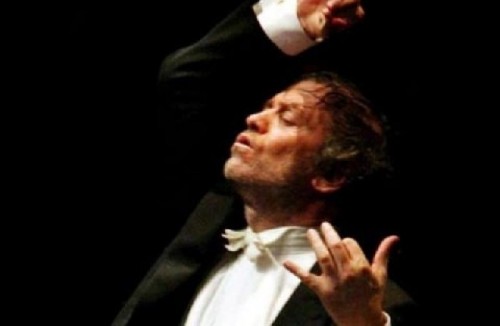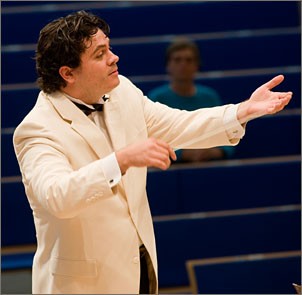World Peace Orchestra Celebrates Solti Centennial
Lady Solti Presents Solti's Life in Music
By: Susan Hall - Oct 21, 2012
World Orchestra for Peace
Valery Gergiev, Conductor
Lady Valerie Solti, Presenter
Angela Gheorghiu, Soprano
René Pape, Bass
Alumni of the Solti Accademia
Tereza Gevorgyan, Matilda Paulsson, Roberto Carlos Gòmez Ortiz, Ross Ramgobin
Cristian Macelaru, Conductor (Solti Foundation US Conductor Award Laureate)
MOZART Overture to The Marriage of Figaro
R. STRAUSS Don Juan
MOZART "In diesen heil'gen Hallen" from Die Zauberflöte
VERDI "Addio del passato" from La traviata
MOZART "Là ci darem la mano" from Don Giovanni
VERDI "Bella figlia dell'amore" from Rigoletto
MAHLER Adagietto from Symphony No. 5 in C-sharp Minor
BARTÓK Concerto for Orchestra
Carnegie Hall
October 19, 2012
This program broadcast live from its performance in Chicago on WQXR Sunday October 21 at 2pm.
The star-studded World Peace Orchestra, comprised of premier musicians from the world over, performed at a Sir Georg Solti Centennial concert under Valery Gergiev. Lady Solti introduced the selections and placed them in the context of Solti's personal life.
The program began with Mozart. The orchestra warmed up on the overture to the Marriage of Figaro. Mozart threaded through the concert.
The great bass Rene Pape auditioned for Solti with a Zorastro aria from Magic Flute. Solti, immediately recognizing the great talent, signed him up for Salzburg.
Pape was in fine form honoring the Maestro at Carnegie. He and the great diva Angela Gheorghiu joined for Giovanni and Zerlina's seduction scene from Don Giovanni. Seductive caresses in the voice and hands, all the beauty of Mozart realized in wonderful acting performances, stationary concert style thrown to the winds in the interests of passion.
Gheorghiu introduced herself with the scene from La Traviata in which she receives George Germont's appreciative, but devastating letter. Georghiu was swathed in a slinky black pencil dress, spangled with sequins in the front of the bodice. As she turned to reveal her bare back, she never gave us her back. Comfortable and blossoming in Carnegie, Gheorghiu simply can't contain herself and gives her all at every moment, in her pitch perfect, lush soprano.
Lady Solti told us her husband met with Richard Strauss who he found to be a consummate gentleman and as well as composer. Strauss may not have tamed Solti, but he helped to shape him. Strauss warned Solti that he jumped around too much while he was conducting.
Solti did not detail his problems as a Hungarian Jew exiled in Switzerland where he had only a piano and could not conduct for four years. While some chastise Strauss for his tight relationship to Goebbels, others like Solti are less willing to cast the first stone. Strauss was in his 70s when Hitler came to power. His beloved only son was married to a Jewess. Strauss' grandchildren were considered Jews. He saved them.
Strauss’ symphonic poem Don Juan is another take on the Don Giovanni story. The seducer is again at work here, particularly in solos for the violin and oboe, representing two of his many mistresses.
Past was linked to future in a quartet from Rigoletto, conducted by Cristian Macelaru, who received the US Conductor's award from the Solti Foundation. The quartet was sung by fabulous young talent from the Solti Accademia in Italy, singers we will be lucky to hear going forward.
Carnegie itself was featured. Lady Solti said that her husband was terrified by the prospect of bringing the Chicago Symphony to Carnegie. At the end his first concert there, Solti and the Chicago Symphony received 25 curtain calls for their performance of the Mahler 5th, whose Adagietto Gergiev played with great feeling and beauty.
Lady Solti mentioned that her husband was completely at ease conducting in a master class at Carnegie in 1994. His musicality and the sound provided by the hall were a perfect match as I sat admiring this supreme musician work.
No place equals Carnegie to honoring Solti and the continuing importance of music for healing, as Muti, now conductor of the CSO, says.
The Concerto for Orchestra was composer Bela Bartok's last completed work. Serge Koussevitsky commissioned it at the urging of Fritz Reiner and violinist Joseph Szigeti. Bartok turned toward a more palatable musical language based on the rhythmic and melodic contours of folk music. The orchestra, playing with panache, gave a vigorous, yet austere rendition, bringing out melodies and rhythmic patterns.
In honoring Solti’s fellow Hungarian, it was easy to see why this concerto is Bartok's most popular work. Every principal player is called upon to solo, yet all this virtuosity is integrated into a work of deep expressive context.
As artists from many different countries participate together to show us how cooperation can be achieved, Carnegie Hall is filled with great music and hopeful feeling,in the spirit of Solti who said, 'I could not escape one very essential idea. Isn't it amazing that we musicians can produce a united Europe or more even a united world. Why can't the politicians?'



